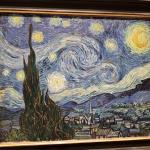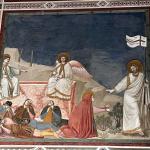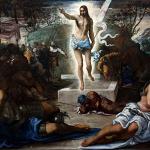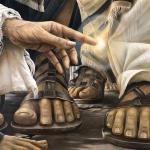“The whole of religion is contained in the Sacraments,” Feuerbach says at the beginning of The Essence of Christianity. That is, “there are . . . no other religious acts than those which are performed in Baptism and the Lord’s Supper.” This being so, Feuerbach claims that “the entire purport and positive result of my work are bathing, eating and drinking,” which is what Baptism and the Supper reduce to when examined through “a faithful, rigid, historical-philosophical analysis of religion.” By thus reducing sacraments to their sensible properties, Feuerbach intends to reveal religion to itself, to “awaken” it to “self-consciousness.”
Sacraments sum up the essence of religion because “they have for their basis natural materials or thing, to which, however, is attributed a significance and effect in contradiction with their nature.” Sacramentality is alienation: As religion is alienation from human existence, so turning simple water into a sacrament alienates the water from the natural properties of water: “as religion alienates our own nature from us, and represents it as not ours, so the water of baptism is regarded as quite other than common water; for it has not a physical but a hyperphysical power and significance; it is the Lavacrum regenerationis, it purifies man from the stains of original sin, expels the inborn devil, and reconciles with God.”
But these effects are not objectively real. If they were, they would be observable. When my hands are dirty and I clean them, I can see the effect. When my soul is dirty and I get baptized, I observe no change. The purification of baptism – sacramentality itself – exists only in the imagination. Feuerbach knows that there is an analogy between the natural properties of the signs and the “imagined” spiritual realities they signify: “water has a significance in itself, as water. it is on account of its natural quality that it is consecrated and selected as the vehicle of the Holy Spirit. So far there lies at the foundation of Baptism a beautiful, profound natural significance.”
Yet, ultimately, “this beautiful meaning is lost again because water has a transcendental effect, – an effect which it has only through the supernatural power of the Holy Spirit, and not through itself. The natural quality becomes indifferent: he who makes wine out of water, can at will unite the effects of baptismal water with any material whatsoever.”
He applies analogous reasoning to the Eucharist: “distinguish a real body from an imaginary one only by this, that the former produces corporeal effects, involuntary effects, upon me. If therefore the bread be the real body of God, the partaking of it must produce in me immediate, involuntary sanctifying effects; I need to make no special preparation, to bring with me no holy disposition. If I eat an apple, the apple of itself gives rise to the taste of apple. At the utmost I need nothing more than a healthy stomach to perceive that the apple is an apple.” In communion, all this is set aside: “an object without objectivity. a body without corporeality, flesh without the qualifies of flesh.” Such things are fantasies, in Feuerbach’s opinion, for flesh cannot be flesh without having the qualities of flesh.
Transubstantiation is the most extreme fantasy, since it ends in nihilism: “all the properties together, whose combination forms this unity, are the substance itself. What are wine and bread if I take from them the properties which make them what they are? Nothing.”
This is the power of faith, the power of imagination, the power to make what is not real real: “Faith is the power of the imagination, which makes the real unreal, and the unreal real: in direct contradiction with the truth of the senses, with the truth of reason. Faith denies what objective reason affirms, and affirms what it denies.” And faith’s contradiction of reality is most intense in the performance of sacraments. Faith nihilates truth: “All criteria of reality and unreality, of unreason and reason, had disappeared: anything whatever that could be imagined passed for real possibility.” If faith makes the unreal real, why not take it a step further and dispense with the sacrament altogether. Baptism no longer treats water as water, nor does the Supper regard bread and wine as bread and wine. But if it can make these natural things into something else, it can create purification and communion ex nihilo, without the problematic intermediation of things: “the process of the Lord’s Supper can quite well, even without the intermediation of bread and wine, without any church, ceremony, be accomplished in the imagination.”
Here is the central contradiction of the sacraments, which crystallizes the central contradiction of religion as such: ” though the Lord’s Supper, or a sacrament in general, is nothing without a certain state of mind, without faith, nevertheless religion presents the sacrament at the same time as something in itself real, external, distinct from the human being, so that in the religious consciousness the true thing, which is faith, is made only a collateral thing, a condition, and the imaginary thing becomes the principal thing.”
This cannot but lead to superstition and immorality: “superstition, because a thing has attributed to it an effect which does not lie in its nature, because a thing is held up as not being what it in truth is, because a mere conception passes for objective reality; immorality, because necessarily, in feeling, the holiness of the action as such is separated from morality, the partaking of the sacrament, even apart from the state of mind, becomes a holy and saving act.”
If religion had the wit to see what is actually happening in the sacraments, it would recognize that they are supreme demonstrations of human power, not divine power. In the Supper, “Man is occupied with himself in and through God. God is the means of human existence and happiness. This religious truth, embodied in a cultus, in a sensuous form, is the Lord’s Supper. In this sacrament man feeds upon God — the Creator of heaven and earth — as on material food; by the act of eating and drinking he declares God to be a mere means of life to man. Here man is virtually supposed to be the God of God: hence the Lord’s Supper is the highest self-enjoyment of human subjectivity.”
To this quite powerful critique of sacramental theology, there are two main rejoinders. First, that the strict materialism that Feuerbach assumes is ungrounded and unsustainable. Human beings are distinct from animals in their possession of consciousness, but he doesn’t even inquire how this might have come about, or how consciousness fits with his materialism. But, second, Feuerbach’s critique hits home most directly and forcefully with religion that works within a natural/supernatural, that tends treats the sacrament as a miraculous exception to a generally non-miraculous creation. For Christian orthodoxy, there is no purely “natural” baseline; that there is water at all with these properties it a breathtaking surprise, a surprise that is caught up in baptism with the miracle that the Creator has entered creation by becoming creature without ceasing to be Creator. Once we demolish the category of “nature,” Feuerbach’s critique, targeted at supernaturalist theories of sacraments, harmless flies past the target.















